Entries in Oratory Church of St. Boniface (1)
Parish-hopping, or life-saving?
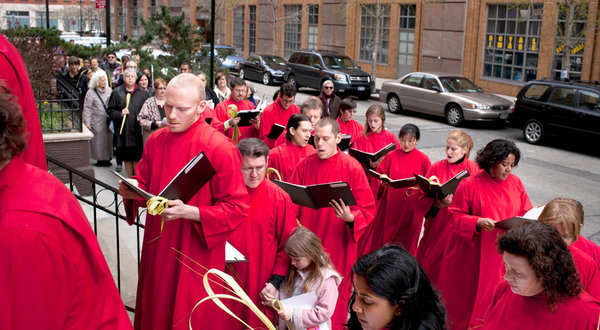 Photo: The New York TimesThis past weekend, our beloved faith community, the Oratory Church of St. Boniface, was featured in a surprisingly admiring profile in the New York Times. I guess we're "progressive" enough to have bypassed the Times' Catholicism gag reflex, but we are also orthodox, liturgically traditional (and magnificent), and growing. Notably, we are a "parish of intention," drawing most of us from other, geographically defined parishes in the city and beyond. (The immediate environs are mostly office space, although new condos and hotels are springing up and sending us new members, too.)
Photo: The New York TimesThis past weekend, our beloved faith community, the Oratory Church of St. Boniface, was featured in a surprisingly admiring profile in the New York Times. I guess we're "progressive" enough to have bypassed the Times' Catholicism gag reflex, but we are also orthodox, liturgically traditional (and magnificent), and growing. Notably, we are a "parish of intention," drawing most of us from other, geographically defined parishes in the city and beyond. (The immediate environs are mostly office space, although new condos and hotels are springing up and sending us new members, too.)
All this raises, amid the good feelings, some questions about the idea of parish "hopping" or "shopping." The notion of a local parish is deeply entrenched, especially in New York City, where many Catholics still identify themselves by parish rather than neighborhood. [Example: I was born in Richmond Hill, Queens. A fellow Queens Catholic will inevitably ask me if I was born into St. Benedict or Holy Child Jesus. The answer is: the former.] So: Should one not "bloom where one is planted"?
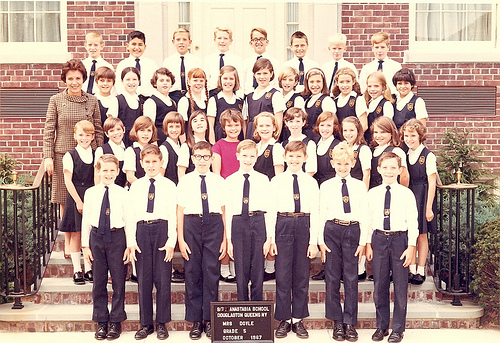 My fifth-grade class, St. Anastasia School, 1967 (I am to the right of the girl in magenta)And all I can answer is: We tried. God, how we tried, starting back in childhood. My dad, an adult convert, tried gamely to embrace post-Vatican II reforms, but he fell in love with the Church of Latin and incense. I can't imagine what it cost him to sit supportively while my "folk group" at St. Anastasia strummed their way through "Teach Your Children." Occasionally, to keep his sanity (and sanctity), we would venture afield for liturgical respite at a more traditional mass, or a parish rumored to have a beautiful pipe organ that was still put to good use. We once tried a semi-outlawed Tridentine mass out on Long Island somewhere; my dad was so orthodox that he insisted upon hearing a licit mass first because the Latin mass wouldn't "count."
My fifth-grade class, St. Anastasia School, 1967 (I am to the right of the girl in magenta)And all I can answer is: We tried. God, how we tried, starting back in childhood. My dad, an adult convert, tried gamely to embrace post-Vatican II reforms, but he fell in love with the Church of Latin and incense. I can't imagine what it cost him to sit supportively while my "folk group" at St. Anastasia strummed their way through "Teach Your Children." Occasionally, to keep his sanity (and sanctity), we would venture afield for liturgical respite at a more traditional mass, or a parish rumored to have a beautiful pipe organ that was still put to good use. We once tried a semi-outlawed Tridentine mass out on Long Island somewhere; my dad was so orthodox that he insisted upon hearing a licit mass first because the Latin mass wouldn't "count."
Flash forward over the years. I have lived in many parishes. All had the most important thing: the true presence of Our Lord in the Eucharist. Many also had dedicated and able clergy and reasonably welcoming communities. All had uniformly ghastly music, but we got used to it. (My dad's trick was to bury his head in his hands prayerfully after Communion, unobtrusively giving him the chance to place a finger over each ear and drown out the caterwauling.) We tried to "offer up" the mechanical homilies, the occasional lunatic outbursts of liturgical dance, the nun-led schemes to festoon the churches with hideous felt-and-burlap banners. In most parishes, I served as a catechist in some well-intentioned but futile Sunday-school program. But when we moved from one neighborhood to another, with every parish leave-taking, we felt as if we were taking our hands from a bucket of water.
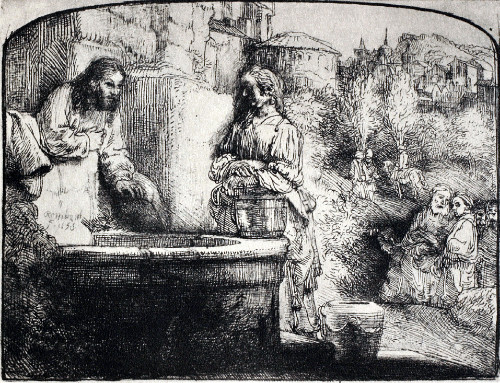 Finally, my husband and I bought a house in Brooklyn. For a decade, we tried to bloom where we landed, to be the "fresh blood" that our fading, once-grand local parish needed, at least in its English-speaking community. (There were vibrant Spanish and Haitian masses, but we are neither Latino nor Creole-speaking.) Meanwhile, family illness and financial stress battered us. Every Sunday, we dutifully endured sermons (mostly scolding) from embittered and exhausted priests, or struggled to glean the garbled message from good-hearted missionary priests who barely spoke English. We had a baby while still caregiving for a host of frail elders. We were spiritually dying of thirst. If you had said the words "pastoral care" to us, we would have had not the faintest inkling what you meant.
Finally, my husband and I bought a house in Brooklyn. For a decade, we tried to bloom where we landed, to be the "fresh blood" that our fading, once-grand local parish needed, at least in its English-speaking community. (There were vibrant Spanish and Haitian masses, but we are neither Latino nor Creole-speaking.) Meanwhile, family illness and financial stress battered us. Every Sunday, we dutifully endured sermons (mostly scolding) from embittered and exhausted priests, or struggled to glean the garbled message from good-hearted missionary priests who barely spoke English. We had a baby while still caregiving for a host of frail elders. We were spiritually dying of thirst. If you had said the words "pastoral care" to us, we would have had not the faintest inkling what you meant.
And so we "hopped" one morning to St. Boniface, where a friend (a refugee from this same parish) said the music was beautiful. It was more than accomplished; it was infused with caring and awe. The welcome was immediate; there was even a coffee hour ("rather Protestant," my mother observed drily). And the homily was warm, articulate, and compassionate, drawn from the lived experience of the priest and delivered as I would speak to an old friend.That's it, in a word: Caring. Everyone seemed to care.
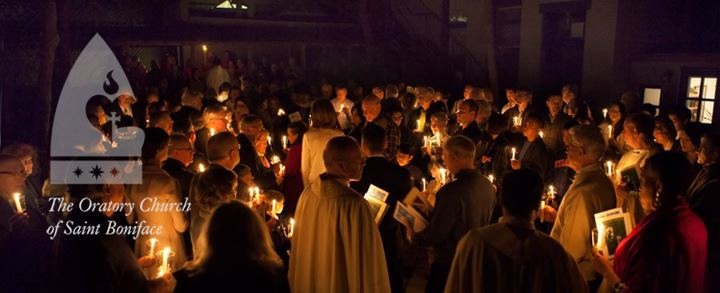 Easter vigil (Photo: Gerri Hernandez)We came more often, for a spiritual booster shot, before returning to our sad, mostly empty home church. (No, I will not name it.) Our daughter was in a stroller, just old enough to start observing her surroundings when we'd say, "You're in church now!" I looked around at the handful of elderly parishioners, listened to the umpteenth rant that we were failing to give enough money, cringed at the wildly off-key leader of song performing her solo. I had prepared class after class of Mexican and Caribbean kids from struggling families to receive their First Holy Communion in this church. Our daughter had been baptised there, by a gifted pastor who burned himself out trying to save the place after years of neglect had brought it to the brink of insolvency. We were tapped out. Like the woman at the well, I felt like saying, "Give me this water to drink so that I don't have to come here anymore!"
Easter vigil (Photo: Gerri Hernandez)We came more often, for a spiritual booster shot, before returning to our sad, mostly empty home church. (No, I will not name it.) Our daughter was in a stroller, just old enough to start observing her surroundings when we'd say, "You're in church now!" I looked around at the handful of elderly parishioners, listened to the umpteenth rant that we were failing to give enough money, cringed at the wildly off-key leader of song performing her solo. I had prepared class after class of Mexican and Caribbean kids from struggling families to receive their First Holy Communion in this church. Our daughter had been baptised there, by a gifted pastor who burned himself out trying to save the place after years of neglect had brought it to the brink of insolvency. We were tapped out. Like the woman at the well, I felt like saying, "Give me this water to drink so that I don't have to come here anymore!"
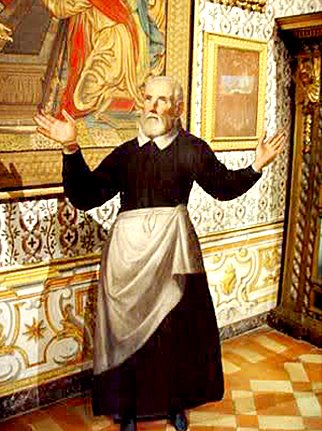 St. Philip Neri, founder of the OratoryOur decision to shop and then hop was a painful one, but one I cannot regret. Often, you can do things for your children that you couldn't do for yourself. And I couldn't bear to have my daughter think "Church" was those bare, ruined choirs. In the years that followed, the community at St. Boniface--not just the clergy, but countless friends--have buoyed us up, inspired us, and modeled Christ for us. I have laughed there (which would make our founder, St. Philip Neri, very pleased) and also wept there, and never have I struggled alone.
St. Philip Neri, founder of the OratoryOur decision to shop and then hop was a painful one, but one I cannot regret. Often, you can do things for your children that you couldn't do for yourself. And I couldn't bear to have my daughter think "Church" was those bare, ruined choirs. In the years that followed, the community at St. Boniface--not just the clergy, but countless friends--have buoyed us up, inspired us, and modeled Christ for us. I have laughed there (which would make our founder, St. Philip Neri, very pleased) and also wept there, and never have I struggled alone.
And this past Christmas, two of my daughter's friends in Catholic high school asked to join us for midnight mass. They loved it. If you know teenagers, you know that this is a miracle.
I am not certain how our geographic parish is doing these days; well, I hope. It is, at least, still open, although its school closed a few years ago. (Our daughter went to another Catholic parochial school nearby, since St. Boniface doesn't have a school.) We transplanted ourselves where we were able to bloom, in a parish that was itself dying until a visionary community rolled up its sleeves and got to work. And now I feel like Peter asking Jesus, "Lord, where else would we go?"